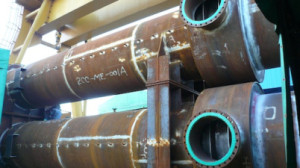Inconel 625- A versatile corrosion resistant material for chemical plants
Inconel 625 is a nickel-chromium-molybdenum alloy that is popular for its high strength, good fabricability and excellent corrosion resistance. Its outstanding corrosion resistance properties increase the alloy’s demand in a wide range of applications that involve high temperature and corrosive environments. High alloy content of Inconel 625 enables it to withstand diverse severely corrosive conditions. In mild conditions like ambient atmosphere, fresh and seawater, neutral salts and alkaline media, there is almost no corrosion. In extremely vigorous corrosive conditions, chromium resists oxidizing chemicals, on the other hand, high nickel and molybdenum contents make the alloy resistant to nonoxidizing conditions. High molybdenum concentration makes Inconel 625 very resistant to pitting and crevice corrosion. Additionally high nickel provides resistance to chloride ion stress corrosion cracking. These corrosion resistance properties have made Inconel 625 the most versatile material for use in the chemical and aerospace applications.
The versatility of Inconel 625 is as a significant material in different corrosive conditions is evaluated.
Aqueous Corrosion
Inconel 625 is one of the highly resistant alloys to resist uniform corrosion and is also suitable for use in non-oxidizing acids and oxidizing conditions. In sulfuric acid solutions at different temperatures, Inconel 625 attains a nominal corrosion of 0.5 mm/yr. Thus, it is a reliable material for use in sulfuric acid based applications.
Localized Corrosion
Inconel 625 provides localized corrosion resistance in chloride solutions. High chromium and molybdenum contents in Inconel 625 are found to be beneficial in enhancing alloy’s pitting resistance.
Chloride stress corrosion cracking
Nickel base alloys are generally immune to chloride stress corrosion cracking. Inconel 625 contains 58% nickel, so it doesn’t crack in boiling 42% MgCl2. The environments where cracking of Inconel 625 may occur are high temperature water and chlorides. The alloy is highly resistant to stress corrosion cracking in synthetic sewage with chlorides and fluorides , pH 3.2 and a temperature of 292oC.
Sulfide stress cracking
Sulfide stress cracking usually occurs in the oil and gas industry. It often causes brittle failure of material under stress in water contaminated with hydrogen sulfide. Inconel 625 is evaluated at room temperature under constant load in a mixture of oxygen free water comprising of 3000ppm dissolved H2S, 5% NaCl and 0.5% acetic acid. The threshold strength of Inconel 625 is near the yield strength in both annealed and cold rolled conditions.
Hydrogen embrittlement
The degree of sensitivity to hydrogen embrittlment is measured as an extent of ductility loss. Inconel 625 offers moderate performance against this type of corrosion.
Intergranular corrosion
Inconel 625 shows stability against intergranular corrosion by precipitation of niobium carbides at 927oC to 1038oC annealing temperature. Niobium carbides associate with carbon to reduce its present for precipitation as chromium carbides in grain boundaries. Chromium loss near the grain boundaries is resulted by intergranular chromium carbide precipitation. This process occurs at specific temperatures and is called as sensitization.
Inconel 625 is resistant to above type of intergranular corrosion when it is properly annealed that will allow the development of niobium carbides. Hence corrosion resistance characteristics of Inconel 625 make this alloy useful in various types of chemical plants that demand materials that can provide reliable and durable performance.


